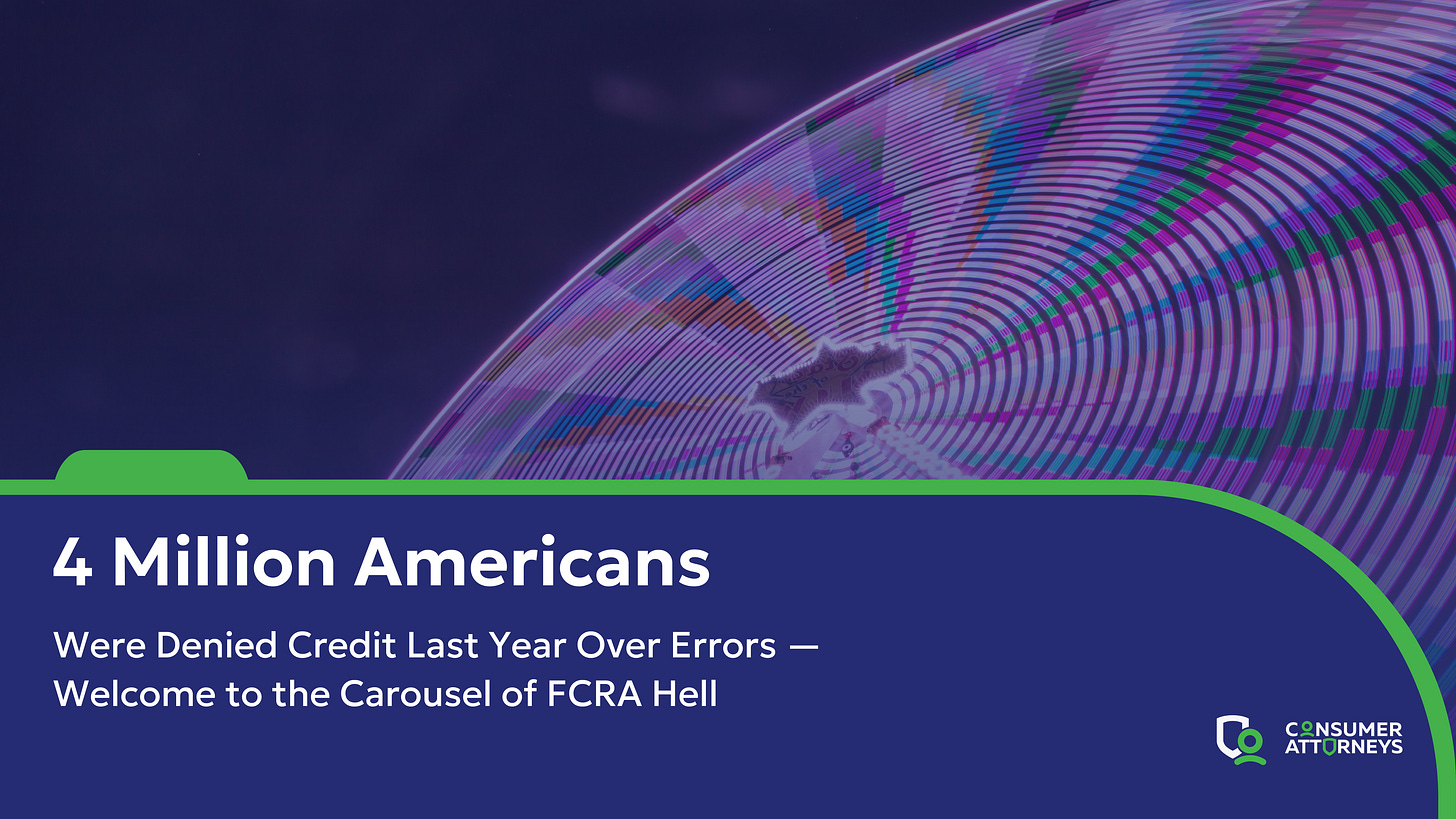4 Million Americans Were Denied Credit Last Year Over Errors
Welcome to the Carousel of FCRA Hell
Let’s Start With the Stat They Don’t Want You to Read Twice
Four million. That’s how many Americans were denied credit last year because of errors on their credit reports. Not missed payments. Not high balances. Mistakes.
Stuff like:
Accounts that aren’t yours.
Wrong late payment dates.
Fake addresses in cities you’ve never visited.
Credit inquiries from companies you’ve never heard of (shoutout to "FastLoanPros888").
If that number doesn’t hit like a malfunctioning slot machine, you’re not paying attention.
Welcome to the Carousel: Step Right Up and Watch Your Credit Tank
Here’s how the system works:
A lender pulls your credit report.
The report says you defaulted on a PayPal Credit account in 2017.
You’ve never had a PayPal Credit account.
Application denied.
You call the credit bureau. Hold music. Transfer. Disconnect.
You file a dispute.
They “investigate.”
They tell you it's “verified.”
The error remains.
Loop to Step 1 with a new lender.
It’s like a county fair ride, but the only prize is a higher interest rate and a stress rash.
What Are These "Errors" Anyway?
Glad you asked. Here’s a list of greatest hits in the Credit Report Hall of Shame:
Mixed Files: Congrats, your credit history is now mashed together with your cousin Reggie, who forgot his student loans existed.
Phantom Debts: Accounts that were closed years ago suddenly come back like bad exes. With worse terms.
Outdated Info: That charge-off from 2011? Still there in 2025. Because time is just a suggestion.
Wrong Account Status: You paid off the card. They’re still reporting a balance. Somewhere, a system says “meh.”
Identity Theft Fallout: Someone opened five lines of credit in your name. Equifax says: “Looks valid to us!”
And the best part? These errors often don’t get fixed until you scream into the regulatory void.
Denied Credit = Real-World Damage
This isn’t just a score problem. It’s a life disruption:
Can't lease an apartment
Denied for a car loan
Paying 8% instead of 2.9% interest
Refused a credit card you needed for emergency expenses
Job applications paused because employers use credit reports too (yes, really)
Your financial future is being throttled by someone else’s sloppy spreadsheet. And no one’s held accountable unless you drag them through court.
So Who’s Supposed to Prevent This?
Four letters: FCRA — the Fair Credit Reporting Act. A law from 1970 that was supposed to:
Give you access to your reports
Allow you to dispute errors
Require credit bureaus to fix false info
Let you sue when they don’t
Sounds solid, right?
Except most people have no clue what their rights are. And the bureaus — Equifax, TransUnion, Experian — bank on that ignorance. Their business model literally depends on selling your data while barely investing in accuracy.
Yes, You Can Dispute… But Good Luck With That
Under the FCRA, you can dispute errors for free. But the system isn’t exactly in a rush to help you out. Here’s what usually happens:
You submit a dispute online.
They send it through an automated system called e-Oscar (yes, that’s real).
The original furnisher (like a bank or lender) is asked if their info is correct.
They click “yes.” No actual investigation.
Dispute closed. Nothing fixed.
Your dispute was “processed.” You still can’t get a loan. Yay?
But Wait — You Can Fight Back
Here’s where it gets interesting: you can sue. The FCRA gives you the right to take legal action if:
The bureaus fail to fix false info
They don’t investigate properly
A company keeps furnishing false data after you notify them
And yes — if you win, they pay your legal fees.
There are attorneys who specialize in this stuff. Some even take it on contingency, meaning you don’t pay unless you win. Because frankly, these companies only care when their errors cost them something.
Frequently Screamed Questions:
“Why is there wrong information on my credit report?”
Because credit bureaus source from third-party furnishers — and no one verifies things thoroughly.
“Can I be denied a loan for something that isn’t my fault?”
Absolutely. And it happens millions of times per year.
“Can I fix it myself?”
Sometimes, yes. But often the error keeps coming back until legal pressure is applied.
“Can I sue if the error caused me to lose credit or a job?”
Yes. That’s exactly what the FCRA is for. Documentation is your best friend.
“Do I have to pay to sue?”
Most FCRA attorneys work on contingency. The companies at fault pay if you win.
You’re Not Broken — The System Is
If you’ve been denied credit for something you didn’t do, it’s not your fault. You’re not alone. And no, you’re not being paranoid — the credit reporting system is sloppy by design.
These bureaus make billions selling your data, while leaving you to clean up their mess when it gets corrupted. It's not justice. It's just business.
So the next time someone says “you should’ve managed your credit better,” feel free to respond with:
“I did. The system didn’t.”
And then maybe send them this post.



